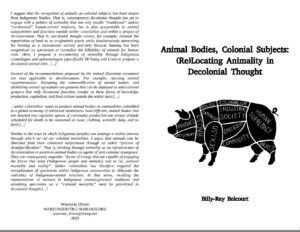
From back cover:
“I suggest that the recognition of animals as colonial subjects has been absent from Indigenous Studies. That is, contemporary decolonial thought has yet to engage with a politics of animality that not only recalls “traditional” and/or “ceremonial” human-animal relations, but is also accountable to animal subjectivities and futurities outside settler colonialism and within a project of decolonization. That is, decolonial thought cannot, for example, demand the repatriation of land as an ecofeminist praxis while simultaneously advocating for hunting as a recreational activity precisely because hunting has been weaponized as speciesism to normalize the killability of animals for human ends. Here, I propose a re-centering of animality through Indigenous cosmologies and epistemologies (specifically Mi’kmaq and Cree) to propose a decolonial animal ethic. […]
Several of the recommendations proposed by the animal liberation movement are thus applicable to decolonization. For example, rejecting animal experimentation, disrupting the commodification of animal bodies, and abolishing animal agriculture are gestures that can be deployed as anti-colonial gestures that reify decolonial futurities insofar as these forms of knowledge production, capitalism, and food culture sustain the settler state.[…]
…settler colonialism wants to produce animal bodies as commodities embedded in a global economy of reiterated deathliness. Said different, animal bodies that are inserted into capitalist spaces of commodity production are always already scheduled for death to be consumed as meat, clothing, scientific data, and so forth.[…]
Similar to the ways in which Indigenous peoples can undergo a violent process through which we rid our colonial mentalities, I argue that animals can be liberated from their colonized subjecthood through an aided “process of desubjectification”. That is, thinking through animality as an infrastructure of decolonization re-positions animal bodies as agents of anti-colonial resurgence.They can consequently engender “forms of energy that are capable of engaging the forces that keep [Indigenous people and animals] tied to [a] colonial mentality and reality”. Settler colonialism has therefore required the normalization of speciesism within Indigenous communities to obfuscate the radicality of Indigenous-animal relations. In that sense, recalling the representation of animals in Indigenous cosmologies/oral traditions and unsettling speciesism as a “colonial mentality” must be prioritized in decolonial thought.[…]
Animal Bodies, Colonial Subjects_(Re)Locating Animality in Decolonial Thought pdf